Redditor Shouts At Stranger’s Dog To Make It Go Away, The Owner Starts An Argument Instead Of Apologizing
OP, the owner of a 14-month-old mini poodle, experienced a traumatic incident when an off-lead Labrador attacked their dog at 5 months old. This required surgery to insert a metal plate and three months of crate rest for the bone to heal.
As a result, OP is incredibly protective of their dog and keeps them on a lead at all times. During a walk in a field near their house, they encountered a man with two lurchers: one off-lead and one on-lead.
The off-lead lurcher barked and snarled at OP's dog while they tried to keep their pet calm and on a short lead. The owner made no attempt to control their animal, and OP shouted profanity at the dog.
The owner then argued that their dog was just trying to say hello and accused OP of taking it out on their pet. OP explained the history of their own dog's attack and the lack of control the owner had over their pet, to which the owner called OP a 'f*cking idiot.'
OP then replied with a profanity of their own, and the owner left. OP regrets the language used but is furious about the situation.
Who was right and who was wrong here? Let's go through the whole story:
OP asks:

OP, the owner of a 14-month-old mini poodle, experienced a traumatic incident when an off-lead Labrador attacked their dog at 5 months old

On a walk in a field near their house, they encountered a man with two dogs: one off-lead and one on-lead.

Understanding Canine Behavior and Human Reactions
Dr. Alexandra Solomon, a relationship therapist, notes that "understanding the emotions of both humans and animals can greatly improve our interactions." When a dog approaches a stranger, it can trigger feelings of fear or discomfort, especially if the dog is perceived as aggressive. According to research on canine behavior, recognizing the subtleties of dog body language can enhance human responses in these situations. For more insights, visit Dr. Alexandra Solomon's website.
Understanding Human-Animal Interactions
Human-animal interactions can elicit a range of emotional responses, both positive and negative. Research in animal behavior and psychology indicates that pets can provide comfort and companionship, which can lead to strong emotional attachments. However, when these interactions become disruptive, such as when a dog behaves aggressively or unpredictably, it can lead to fear and conflict.
According to a study in the Journal of Applied Animal Welfare Science, the emotional responses of pet owners can significantly affect their behavior toward others, including how they manage conflicts arising from their pets' actions.
The owner made no attempt to control their animal, and OP shouted profanity at the dog.
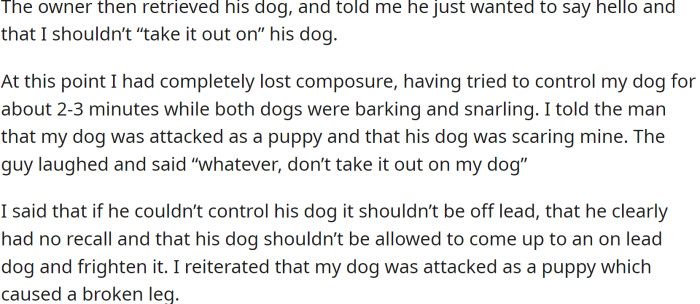
The owner then argued that their dog was just trying to say hello and accused OP of taking it out on their pet.
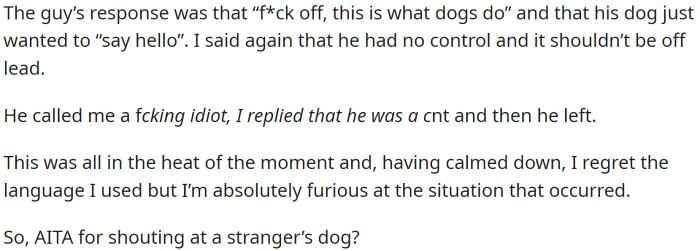
OP has offered the following explanation for why they think they might be the a-hole:

Moreover, Dr. John Paul Scott's research on animal behavior indicates that human interactions with dogs can trigger strong emotional responses. When a person feels threatened, their fight-or-flight response can lead to reactive behaviors, such as shouting.
This response can escalate tensions and create conflict, highlighting the importance of maintaining composure in stressful situations.
Moreover, the dynamics of conflict between pet owners and non-pet owners highlight differing perspectives on animal behavior. A clinical psychologist notes that while pet owners may view their animals as part of the family, non-pet owners might not understand these emotional bonds. This disconnect can lead to misunderstandings and heightened tensions in public spaces.
Studies suggest that clear communication and empathy can help bridge these gaps, ensuring that all parties feel respected and understood.
Off-leash dogs can be scary

Off-lead etiquette is totally different in the UK
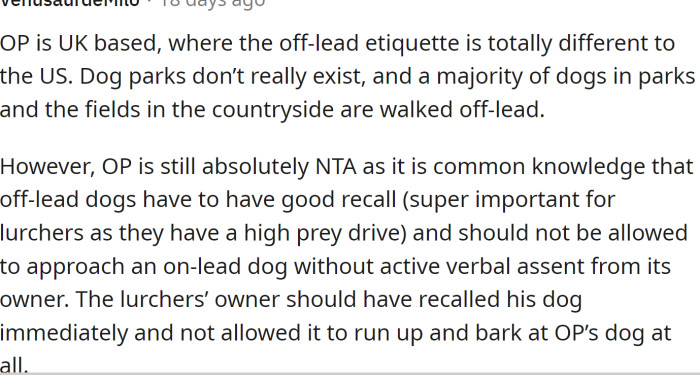
This Redditor found the info about the UK enlightening:

Effective Communication with Dog Owners
Effective communication is crucial when addressing concerns about dogs. Dr. Marshall Rosenberg’s Nonviolent Communication framework can help individuals express their feelings without escalating conflict.
Using 'I' statements can facilitate discussions about concerns, enabling a more constructive dialogue with the dog owner.
Effective Conflict Resolution Strategies
In situations of conflict involving pets, employing effective communication strategies is crucial. Research indicates that using a calm, non-confrontational approach can help diffuse tensions. For instance, acknowledging the other person's feelings and expressing a willingness to find a solution can lead to a more collaborative atmosphere.
Moreover, the use of 'I' statements can help individuals express their concerns without assigning blame, making it easier to navigate difficult conversations. For example, saying 'I feel uncomfortable when the dog comes close to me' rather than 'Your dog is bothering me' can lead to a more productive discussion.
UK Redditor says:

The law itself is very sound; there's no enforcement.
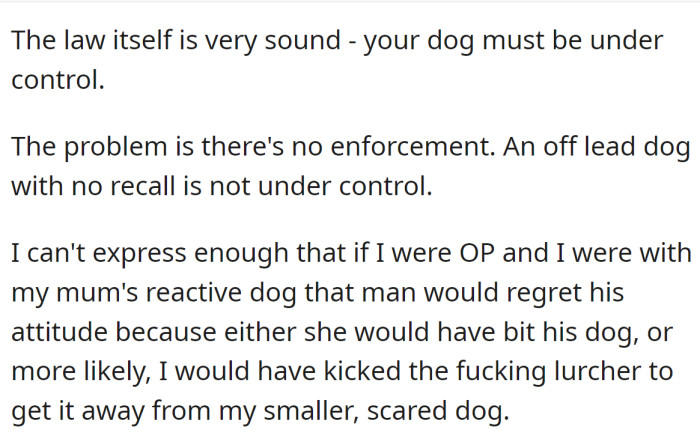
This Redditor shared their experience:
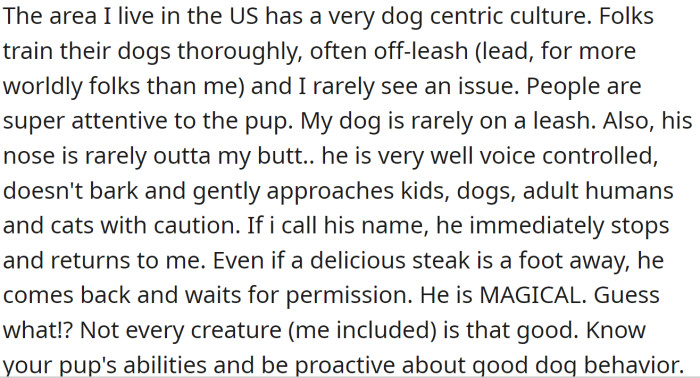
Additionally, understanding the emotional dynamics at play can help de-escalate situations. Research shows that maintaining a calm demeanor can influence the behavior of both the dog and the owner, leading to a more positive interaction.
As highlighted in studies, calm communication often leads to better outcomes in tensions involving animals.
Additionally, establishing boundaries regarding pets in shared spaces can prevent conflicts from escalating. Research supports creating clear agreements about how pets will be managed in environments where multiple parties are present. This proactive approach can foster mutual respect and understanding, reducing the likelihood of confrontations.
Ultimately, fostering an environment of cooperation and respect can lead to more harmonious interactions involving pets.
You have to know your dog
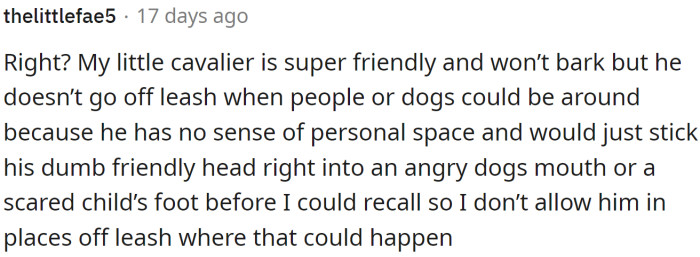
Not everyone likes dogs or wants them running up to their kids
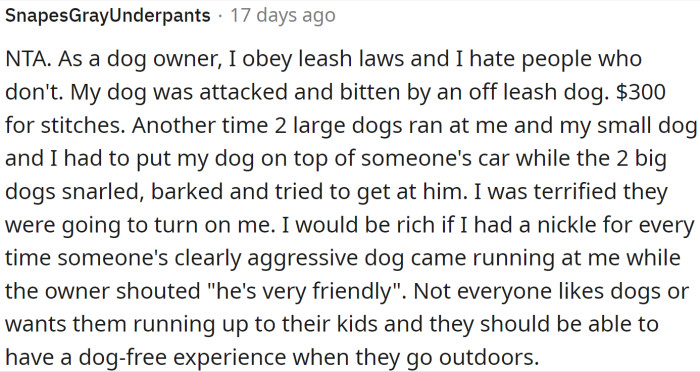
The debate over whether dogs should be kept on-leash or off-leash in public places is ongoing. On-leash advocates argue that it is not safe for dogs to be off-leash in public areas, as they may become aggressive or unpredictable and put other people and animals in harm’s way.
Off-leash advocates argue that dogs should be given the opportunity to roam free and get exercise as long as they are well-trained and supervised. On-leash proponents cite public safety as the primary reason for keeping dogs on-leash.
They point out that any off-leash dog has the potential to become aggressive, especially when confronted with strangers, other animals, or strange objects. They also worry that an off-leash dog could harm itself or another person if it runs into a busy street or gets lost.
Off-leash advocates contend that responsible pet owners can safely allow their dogs to roam free in public areas as long as the dog is well-trained and supervised. They point out that an off-leash dog, if properly trained, will be able to obey commands and stay out of danger.
Who is right here?
Psychological Analysis
This situation highlights the complexities of human-animal relationships and the emotional stakes involved. It's important for pet owners to recognize that not everyone shares the same connection to animals, and fostering understanding is key to resolving conflicts.
Analysis generated by AI
Analysis & Alternative Approaches
In conclusion, navigating conflicts involving pets requires understanding and effective communication strategies. Recognizing the emotional bonds individuals have with their pets can help foster empathy among all parties involved. By employing clear communication techniques and establishing boundaries, conflicts can be resolved more amicably, leading to better relationships in shared spaces.
Practical Steps for Conflict Resolution
To resolve conflicts involving dogs more effectively, individuals could practice active listening when discussing their concerns. Dr. John Gottman's research on relationship dynamics suggests that listening actively can significantly reduce defensiveness and promote understanding.
By approaching the situation with empathy and a willingness to understand the owner's perspective, individuals can create a more cooperative environment for resolution.
Analysis & Alternative Approaches
Navigating conflicts involving dogs requires understanding and effective communication. Clinical psychologists stress that maintaining composure and empathy is crucial for resolving interpersonal conflicts.
As research indicates, 'Calm and constructive communication can transform potential conflicts into opportunities for connection and understanding.' This principle is vital for promoting harmony in communal spaces.



